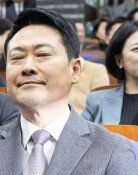Biz Complexes Profiting From `Green Revolution`
Biz Complexes Profiting From `Green Revolution`
Posted June. 30, 2009 08:13,
Sunkyong Watech is a small company based at the Onsan National Industrial Complex in Ulju County in the southern port city of Ulsan. Around 11:30 a.m. yesterday, three large circular tanks each measuring 13 square meters were seen installed on the companys second and third floors.
Large fans were stirring an orange-colored fluid inside the tanks, which smelled sour.
Lee Seon-sam, Sunkyongs research and development director, said, This is a jewel that fetches the company 200,000 (155 U.S. dollars) to 300,000 won (233 dollars) per ton, adding, Just four hours ago, the fluid was industrial sewage generated at a nearby factory of Dow Metal, which recycles catalysts.
The sewage contains ammonia. We catalyze ammonia with phosphorus and produce the product NP Series. The product is sold to companies equipped with sewage treatment facilities. The NP Series is a kind of nutritional supplement that helps culture microorganisms that expedite sewage treatment.
○ Turning sewage into jewels
Sunkyong receives 70,000 won (54 dollars) per ton of sewage by sewage producers, including Dow Metal, for taking over the waste. The waste serves as a raw material for its products.
The company earns nearly 90 million won (70,000 U.S. dollars) per month by selling NP Series products and earning fees for treating sewage. The amount is fairly big for a corporation with just 38 staff and nearly twice the revenue it earned early after its launch in 2007.
The key to Sunkyongs rapid growth is cost competitiveness. Our rivals purchase raw materials abroad but we make nutritional supplements using industrial sewage, and are even paid when buying certain raw materials, said company president Cho Dong-won. Our products are nearly 30 percent cheaper than those supplied by our rivals.
The business is also a win-win game for Dow. It is cheaper for Dow to hand over sewage to Sunkyong than getting it disposed by other sewage treatment companies.
At the Yongyeon Industrial Complex in Ulsan, a waste heat reuse campaign is underway called Anabada, which is the abbreviation of the Korean words meaning save, share, exchange and reuse.
The campaign has proven lucrative for KP Chemical and Hansol EME, who sell steam generated in the process of textile production and paint incineration.
They make money from Korea PTG, a maker of textile products which can only generate high pressure steam. Korea PTG buys low and middle pressure steam from KP and Hansol.
Previously, Korea PTG had to reduce the levels of high pressure steam to low to mid pressure, something which cost money.
After the company started buying steam, however, it began selling high pressure steam to the chemical company SKC for profit. The three companies earned a combined 4.2 billion won (3.26 million dollars) a year by selling steam to one another.
achim@donga.com lovesong@donga.com







